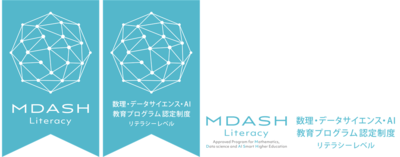Student life
Mathematics, data science, AI education program (literacy level)
*For enrollees from 2022 onwards
At our university, we have set up the following educational programs so that undergraduate students can increase their interest in mathematics, data science, AI, etc., and systematically acquire the necessary knowledge and skills.
Ministry of Education, Culture, Sports, Science and Technology Mathematics, Data Science, AI Education Program Certification System (literacy level)
This program has been accredited by the Ministry of Education, Culture, Sports, Science and Technology's "Mathematics, Data Science, AI Education Program Accreditation System (literacy level)" (certification expiration date: March 10, 3).
- Ministry of Education, Culture, Sports, Science and Technology "Mathematics, Data Science, AI Education Program Certification System (literacy level)"
- Contents of application to the university's accreditation system
1.Name and outline of the educational program
| (1) Name | "Mathematics, Data Science, AI Education Program (literacy level)" |
| (2) Outline | A mathematics, data science, and AI education program (literacy level) will be set as a common undergraduate education program for the entire university, and a certificate of completion will be issued to those who complete this program. In addition, this program is a literacy program that forms the basis for learning mathematics, data science, and AI. educate. |
2.Course subjects and completion requirements
| Class subject | school year | unit | Completion requirements |
| Introduction to Data Science A | 1 | 1 | Acquire credits by completing two courses. |
| Introduction to Data Science B | 1 | 1 |
3.Abilities that students can acquire
(1) "Introduction to Data Science A"
- Know the impact on society and understand the significance of learning mathematics, data science, and AI.
- Learn about the latest trends in data and AI research and use.
- Know the types of data and how they are collected.
- Know the application areas of data and AI.
- Learn about specific data and AI utilization and development cases.In particular, learn about the use cases of data and AI in the ocean.
- Understand ethical, legal, and information security issues in data and AI utilization.
(2) "Introduction to Data Science B"
- Understand the basics of statistics, visualization, and methods for handling data.
- Get an overview of technologies for data and AI utilization.
- Know the process of learning a model from data.
Four.Positioning of this program in mathematics, data science, and AI education
Mathematics, data science, and AI education following the literacy level can be organized as follows, so please refer to it for future learning.
- Data Representation and Algorithms: "Mathematical Basics (Statistical Mathematics, Linear Algebra, Calculus)", "Algorithms", "Data Representation", "Programming Basics"
- AI/Data Science Fundamentals: "AI Fundamentals", "Data Science Fundamentals", "Machine Learning Fundamentals and Prospects", "Deep Learning Fundamentals and Prospects"
- AI/Data Science Practice: "Data Engineering Fundamentals", "Data/AI Utilization Planning/Implementation/Evaluation"
- Advanced mathematics: "statistical mathematics", "linear algebra", "calculus"
- Fundamentals of AI Application: "Machine Learning", "Deep Learning", "AI Technology Related to Intellectual Activities"
- Data Science Applied Basics: "Data Handling", "Learning Analysis", "Optimization"
- Data Engineering Applied Fundamentals: "Data Engineering", "Various Libraries and Frameworks"
Five.Results of self-inspection and evaluation
Links(Opens the link in a separate window. Moves to a page outside the site.)
Ministry of Education, Culture, Sports, Science and Technology HPMathematics/data science/AI education program certification system (literacy level)'




